Talk with our local travel specialist who can help organize your trip.
Nepal and Bhutan- Which is the better for Tourist?
Nepal and Bhutan are the two landlocked countries between India and china. These two countries are small in the geographic area and are least developed compared to other countries but are rich in natural beauty and culture. Nepal and Bhutan lie in the laps of the majestic Himalayas that go in a curve from the north-east side of Pakistan to China's southwest side. Both countries attract thousands of tourists every year for sightseeing, trekking, hiking and exploring the beauty itself.
Nepal and Bhutan are considered the best places to relax and escape the daily busy lives. Bhutan is small, but there are lots of beautiful places and museums that have become a reason for attracting tourists and Bhutan is clean and free from dust and smoke.
Table of Content
- How To Get Nepal And Bhutan
- Visa Policy, Travel Documents
- Activities In Bhutan
- Activities In Nepal
- Travel Season
- Weather And Climate Of Bhutan
- Major Cultural Attractions Of Bhutan
- Major Cultural Attractions Of Nepal
- Religion Of Bhutan
- Religion Of Nepal
- Travel Cost
- Bhutan Local Lifestyle
- Nepal Local Lifestyle
- Technology – WIFI, ATMs, Accommodation
- How To Plan
- Conclusion
Bhutan is one and only country in the world which is carbon negative. There are many beautiful places and famous monasteries like Paro Taktsang, Tasichho Dzong, Gabgtey monastery, etc. A very old and beautiful museum called a cultural museum in Paro in western Bhutan. There are other beautiful places which are famous for tourism. Though Bhutan is small but no other countries can compete to Bhutan regarding natural resources and beauty.
Nepal is a beautiful country where thousands of tourists visit Nepal to enjoy the natural beauty and it is also famous for trekking, bungee jumping and climbing. Mount Everest is known as the highest mountain in the world which has become the biggest identity to be known in other foreign countries.
Every year thousands of people visit Nepal for mountain climbing. There is another place of Nepal like Pokhara, Manang, Mustang, Kathmandu, Lumbini, Sagarmatha National Park, etc which are the paradise and tourism places of Nepal. There are many religious temples and stupas in Nepal but the famous temple is Pashupatinath where people from other county and places come to worship God and visit the temple. In the same way, Bhutan is also regarded as a beautiful and touristic country.
How To Get Nepal And Bhutan
Nepal: If you want to travel by Air, there are no direct flights from the major countries such as Europe, America or Australia. However, connecting flights will lead you to the only international airport in Nepal, Tribhuvan International Airport. You can get to Nepal from other Asian countries like India, China, Thailand, Singapore and Arabian country for shorter distances.
If you want to travel by the roadways, it can be done from India or China via Tibet. Most people come from India from the southern part of Nepal. The three major border crossings for tourists is Sonauli/Belahiya from Delhi; and most of North India (via Gorakhpur) and Kolkata via Patna; Raxaul/Birgunj from Bodhgaya Varanasi and Kakarbhitta, from Darjeeling and Kolkata via Siliguri.
Bhutan: If you want to reach Bhutan by land, you can do so by crossing the borders of Phuentsholing, Gelephu and Samdrup Jongkhar. Phuentsholing is 170km on the eastern side of India. From here, you can travel for 6 hours to reach Thimphu. Gelephu is 250 km from Thimphu and you will have to cross three districts which will take about 10 hours. The district of Samdrup Jongkhar is in Bhutan's south-eastern side, which is 150 km away from Guwahati, the capital city of Assam (India).
You can also get a flight to the Paro International Airport via Druk Air and Bhutan Airlines. Paro is situated at 2,225 m above sea level. You can get flights from major cities such as Delhi, Bangkok Dhaka, Kathmandu, Guwahati, Singapore and so on.
Visa Policy, Travel Documents
Bhutan
Applying for a visa to Bhutan is neither done by the embassy nor online. The only way to get a visa to visit Bhutan is to book a tour package with a licensed tour operator. After the tour package and visa fee are paid, the visa is applied through the Tourism Council of Bhutan to the Department of Immigration. Detailed information of your passport, a colored scanned copy of the passport and passport photo is sent to the tour agent to use to fill in the application. After the application is done, the foreign ministry will issue the visa clearance number and sent it to the tour agent and immigration terminals in the checkpoint via the Tourism Council of Bhutan.
For international visitors, the Bhutan Visa costs USD 40 per person. Visa is valid for 15 days despite the length of your tour in Bhutan or it could be valid for the exact duration of the trip. In case you want to extend your visa, it is around USD 8 per person.
Nepal
Getting a visa in Nepal is simple. If you arrive via flight, you can get a visa on arrival on the airport, Tribhuvan International Airport. You can apply for the visa online as well where it is mandatory to travel within six months after the visa approval. These visas are multiple entries meaning you can travel into India and China or visit Nepal before the expiration. You can also get the visa on the borders if you are traveling by bus from the neighboring countries, India and China.
A 15-day visa costs around USD 25, 30 days visa is USD 40 and a 90 days visa is USD 100. For visa extension, you need to fill the visa extension form, print it and have the passport's details to submit it to the immigration office for an interview.
Activities In Bhutan
Bhutan offers similar sports such as cultural tours, trekking, biking, rafting, climbing. Bhutan has a lot of activities that can be done in peace without exhausting you or stressing you out. The most popular activity is to visit Tshachus (hot spring). The natural hot spring is believed to have healing properties that can cure body aches, skin problems and sinus problems. You can relax in the hot spring and be at peace. Bhutan also has the best fishing rivers and lakes. Many people fish for snow and brown trout. But you need a permit to fish that can be easily available; there is a strict policy on catching and releasing the fish.
Activities In Nepal
Nepal is the best choice when it comes to trekking and climbing in the Himalayas. The main reason is Mt Everest (8848m), the tallest peak in the world, itself. Nepal is home to 8 out of 14 tallest mountains over 8000m. Any trekkers either novice or experienced can get the thrill and experience of trekking in the beautiful mountains. Also, being a country full of hills, you can hike to any place in the country within a short time and budget.
Many trekkers are lured to Nepal because of the trek to Everest Base Camp, Annapurna Base Camp and other extraordinary passes and trails. Nepal is surely a trekking country, but apart from this, you can enjoy adventure sports such as paragliding, boating, cycling, canoeing, rafting, etc. Nepal has a diverse altitude that is a paradise for adventure lovers. In Nepal's higher altitude is the Annapurna Mountain and Mt Everest due to which trekking in Nepal has attracted thousands of trekkers from all over the world. You can sight-see the tallest peaks, beautiful landscapes and enjoy the narrow trails in the mountains. The trekking trails can be used for mountain biking and enjoy the thrill and beauty at the same time. Nepal is home to fast rivers flowing from the mountains. You can enjoy white-water rafting in the Trishuli River. You can also enjoy plenty of adrenaline rush sports such as bungee jumping, abseiling and so on in most places in Nepal.
Recommended Read: 10 Amazing Things To Do In Nepal
Travel Season
Both the countries lie on the south side of the Himalayas which makes their climate and season similar. These countries have something to offer each season. Spring (March to May) and Autumn (September to November) are the best time to visit both countries.
The best season to visit Nepal is during spring (March to May) and autumn (September to November). The sky is clear and there are fewer chances of rain. The weather is dry until the start of the monsoon (June to August) and it gets humid and hotter in the monsoon season. The monsoon season is difficult to travel in because of heavy rainfall, wet and slippery road trails. The visibility of the mountains becomes unclear due to the heavy clouds.
The coldest season in the year is winter that starts from December to February. Trekking and climbing in the winter to the higher altitude destination is not recommended as the temperature falls below zero degrees Celsius. But the trails are less crowded and trekkers can enjoy the scene more freely. However, you can travel to the lower Terai region where the weather is pleasant and subtly warm. You can explore Kathmandu Valley and Chitwan National Park when the temperature is cool and suitable to travel.
The best time to visit Bhutan is from September to November where Bhutan's climate is similar to Nepal. The sky is clear and the surrounding is stunning to watch with greener fields and colorful flowers on the background. You can observe a large flock of migrant birds at the end of the season. Also, it is the best time to see rare birds like rare black-necked cranes in this season.
The winter season from December to February becomes extremely cold at the higher altitude. But in the lowland areas in the south, the climate is sub-tropical and suitable to travel. During the spring season of March to May, the weather clears up and becomes warm. The climate becomes dry and pleasing and you can see stunning rhododendron trees blossom. During the monsoon season of June to August, the weather is dried up and not many tourists visit the country. Due to heavy rainfall, less visibility and slippery roads, it is a low season for tourists in Bhutan.
Recommended Read: Best Time To Visit Bhutan And Nepal
Where to travel next?
Get help from our travel specialists for holiday ideas that matches your interests.
Weather And Climate Of Bhutan
|
Season |
Average Temperature |
Average Rainfall |
|
Spring (March-May) |
4- 23°C (39-84°F) |
23-57mm |
|
Summer (June-August) |
15-25°C (59-77°F) |
120-345mm |
|
Autumn (September-November) |
5-23°C (41-73°F) |
8 -155mm |
|
Winter (December-February) |
3-15°C (37-59°F) |
0 -21mm |
The climate of Bhutan is varied. Bhutan's southern part is hot and humid where the temperature ranges from 15-30 degrees Celsius/ 59- 86 degrees Fahrenheit. In the central part, the climate is warm summers and dry winters. The northern part is colder and often snows.
Weather And Climate Of Nepal
|
Season |
Average Temperature |
Average Rainfall |
|
Spring (March-May) |
8 – 29°C (46 -84°F) |
10 -70mm |
|
Summer (June-August) |
17 – 29°C (62-84°F) |
129-239mm |
|
Autumn (September-November) |
7 – 19°C (44-66F) |
7-67mm |
|
Winter (December-February) |
2 – 11°C (35-51°F) |
0-8mm |
The climate of Nepal is varied in the southern and northern part. In the north, the summers are cool and winters are extreme while in the south, the summers are extremely hot and winters are moderately colder. In Terai, the summer temperature goes above 45 degrees Celsius while in the winter, the temperature ranges from 7 to 23 degrees Celsius. In the Himalayas and hilly zones, the summer is moderate with winters extremely cold that go below 0 degrees Celsius.
Major Cultural Attractions Of Bhutan
Bhutan is a Buddhist nation that has made it the national religion for more than 1200 years. It was initially introduced in the 8th century by Buddhist master, Padmasambhava (Guru Rinpoche). Buddhism is present in the kingdom and has influenced the everyday lives of the people. Bhutan is known for its monasteries, stunning temples and shrines found amidst Bhutan's mountains and valley. The major cultural attractions are:
- Paro Valley: Paro Valley is one of the gorgeous valleys and has ancient temples. It is famous for numerous monasteries and is a place to produce red rice. Paro Dzong, Paro Tsechu, Taktsang Monastery, Kyichu Lhakhang, Drukgyel Dzong and so on are the major sites.
- Thimphu Valley: It is another major cultural site in Bhutan situated at the elevation of 2300m. You can find different architectural fortress in which Taschichho Dzong is one of them.
- Wangdiphodrang: It is an ancient building built in the 17th century and is situated at 1350m in the south of Punakha. It is known as Wangdi Dzong located at the junction of 2 rivers- Punakhachu and Tang-chu.
- Bumthang Valley: It is one of the important cultural sites and a tourist destination that has an ancient Buddhist temple.
- Mongar: This place has the newest dzong of Bhutan. It holds great importance ever since it was built in the year 1930. The traditional architecture is exceptional to view.
Major Cultural Attractions Of Nepal
Nepal is a Hindu country with a small percentage of Buddhists in the country. Nepal is a small country but this large number of ethnic groups and their culture have amazed tourist people, which has become a reason to visit Nepal to see the different cultural attractions.
- Kathmandu Valley - Kathmandu is Nepal's capital, which has 7 out of 10 UNESCO World Heritage Site. Kathmandu valley consists of sister cities such as Bhaktapur and Lalitpur which are famous for their beauty and cultural importance. You can find numerous ancient architectures and wood-carvings. You can visit Pashupatinath's holy site, the Buddhist stupa of Boudhanath and Swayambhunath, the oldest Hindu temple of Changunarayan and ancient durbar squares.
- Lumbini -Lumbini, the birthplace of Gautam Buddha is located in the southern Terai plains of Nepal. In 1997, Lumbini was named in the list of world heritage sites. It was believed that Buddha was the final rebirth of his incarnation in this world. The myth has it that he steeped seven steps just after his birth and regarded to be the incarnation of God. You can explore the popular destinations, Burmese (Myanmar) Temple, Maya Devi Temple, such as Lumbini Garden, China Temple, Thai Monastery, World Peace Pagoda, Nepal Buddha Temple Tara Foundation and Dharmaswami Buddhist monastery.
- Janakpur- Janakpur is on the southeastern side of Kathmandu and has many temples. The city has numerous architectures and is bounded by natural beauty. You can explore Janaki Mandir which is dedicated to Goddess Sita and is the oldest temple in Janakpur. You can find more than 100 sacred ponds in Janakpur along with the famous art from Maithili women.
Recommended Read: Top 10 Things To Do In Kathmandu Nepal
Religion Of Bhutan
Bhutan is a country with Buddhism as the most prominent religion that reflects in its culture and heritage. About 75% of the population follows Buddhism. Tibetan immigrants form the largest Buddhist population. The religion is reflected in the monuments, architecture, monasteries and the lifestyle of people. Also, about 22.6% of the total population is Hindu, 0.9% is Christians and only 0.1% is Islam. Moreover, the country has the freedom to preach any religion. As a Buddhist country, people dress up similarly and maintain silence to show respect for their deity.
Religion Of Nepal
The major religion followed in Nepal is Hinduism which contributes to 82% of the population. Due to this, there are more Hindu sites such as Pashupatinath Temple. Lord Shiva has considered the guardian deity and the cow is the national animal. Also, there are 9% of the population follows Buddhism. Lumbini in Nepal is the birthplace of Lord Buddha which attracts most of the tourists from the globe. About 4.4 % of the population follows Islam and 1.4% follows Christianity. All in all, the country is secular and gives freedom to choose any religion. People of all religions, ethnicity and caste are accepted in Nepal.
Travel Cost
With the wide array of sightseeing, exploring and trekking choices, both countries have their own travel cost.
Nepal is an inexpensive place to visit and during the 70s and 80s, backpacking in Nepal was the only way to travel. Even though there are fewer backpackers now, Nepal is still an affordable nation to visit with a low cost of accommodation, food, entry fees and public transport. Nepal has more affordable options with affordable hotels, hostels, food and tour packages.
Bhutan is a little bit expensive than Nepal for the tourists are required to pay a daily minimum fee of USD 250. No matter what tour you opt for, the minimum amount per day will not be any lower than this. The tariff set by the government is designed to reduce tourists to maintain their environment. Also, Bhutan is aiming at the higher end of the tourist rather than any inexpensive tours found in other places. The tariff covers all the normal expenses in Bhutan, such as 3-star accommodation, meals, tour guides, drivers and vehicles. The cost adds up if you opt for 4-5-star accommodation.
The tariffs are paid to go to the government to reduce the poverty in the country and help with the education system. The Tourism Council of Bhutan holds the full cost of the tour in Bhutan until the end of the tour. A certain percentage of the tour is given to the tour agent once the touring survey is completed.
Recommended Read: Bhutan Tour From Nepal - All You Need To Know
Where to travel next?
Get help from our travel specialists for holiday ideas that matches your interests.
Bhutan Local Lifestyle
The traditional lifestyle of Bhutanese makes it outstanding to visit. This Buddhist nation believes in karma meaning doing good to receive good in their next birth. They generally start their day with offering water in the seven-seat ting. They start early in the morning and finish the day at around 10:30 in night. Paro Tshechu, Thimphu Tshechu and Punakha Tshechu and Drubchen are the most common Bhutanese festivals in Bhutan. the Bhutanese follow a highly refined system of etiquette, called "driglam namzha."
This traditional code of conduct shows respect for authority, dedication to marriage and family and devotion to civic duty.
The typical yet simple lifestyle makes people happy which increases their gross happiness index. People are engaged in trade, agriculture and other services for a living. Bhutanese people enjoy their meals which are spicier and hotter. The national dish of Bhutan called Ema Datshi is also made up of spicy chilies and local cheese. The tradition of inheritance in Bhutan has a unique way of respecting women.
Nepal Local Lifestyle
Nepal is a country of a diverse ethnic, cultural and religious group of people. As Nepal's geographical structure is divided into Himalayan, Hill and Terai, the lifestyle of people also differs from the climate and geography of a place.
The Himalayan region lies in the northern part of Nepal which is covered with mountains. Sherpas, Bhotes, Thakalis, Lholmos are the inhabitants who live and celebrate Lhosar, Udhauli-Ubhauli and Buddha Jayanti in this region. People wear thick woolen clothes (Bakku, Docha), eat dairy products, meats and homemade alcohol. People are engaged in tourism, agriculture.
Hill region lies in the central part of Nepal. Brahmins, Chhetri’s, Newars, Gurungs, Magars are inhabitants who live and celebrate Dashain, Jatras and Shivaratri in this region. People eat rice, paddy, corn, wheat in this region. People are engaged in trade, agriculture, services. The Terai region lies in the southern part of Nepal. Yadav, Muslims, Brahmins, Kurmis, Mushars, Kushwas are inhabitants who live and celebrate Chhath, Holi, Eid in this region. The majority of people are engaged in agriculture. People eat, rice, wheat, dairy products etc. this region is more industrialized than other regions due to the plain land structure.
Technology – WIFI, ATMs, Accommodation
Bhutan
Only some cities of the nation that are considered modernized and westernized have WIFI and ATM services. Internet facilities are available including WIFI services in few hotels the speed of WIFI may differ. There is a couple of internet places in the capital Thimphu, hotels and web cafes are there which provide WIFI services. Other provinces like Paro, Trongsa, Bumthang have considerable availability of WIFI services.
Outside these cities, internet services like mobile networks are available but WIFI services are very limited. For the tourists, it is best to carry a new sim card during their trip to Bhutan. Like WIFI services, ATM services are not available in all provinces. ATM services can be abundantly found in the capital Thimphu but outside Thimphu it is limited. Bhutanese ATMs does not accept international cards which compels the tourists to carry cash. Only big towns like Paro and Thimphu have more ATMs outside these towns Bumthang has 2-3 ATMs which are not reliable.
Nepal
ATM services have been popular in Nepal within a few years. People in city areas prefer no cash and just a card or any e-banking for their comfort. Cities like Kathmandu, Pokhara, Bhaktapur have plenty of ATMs. International cards are also accepted in a few ATMs of Nepal. ATM services are provided but it lacks proper security. In some ATMs people are compelled to withdraw minimum accounts and some ATMs don’t function properly. Outside the Kathmandu valley and few tourist areas, ATM services are limited. Tourists who plan to visit Nepal's remote areas must withdraw cash before their travel or exchange their international currency from Nepal Rastra Bank to avoid consequences.
How To Plan
Getting to Bhutan and Nepal is easy. You can simply plan your tour or talk to us for any inquiries. You can fill out the form given or directly call us at the number given on the site.
Recommended Read: 12 Days In Nepal And Bhutan - Where To Go And What To Do?
Conclusion
If you love both countries and have a hard time deciding which country to visit, then this shall cheer you up. You can travel to both countries in a single package. Bhutan Nepal Tour is one of the amazing tour packages one can experience. You can get an insight into the cultural and natural beauty of both countries. This tour lets you know the similarities and differences of the Himalayan Kingdom in detail. Like most tourists, you can enjoy the tour in Nepal first before going to Bhutan. But it depends on your choice and preferences on where to travel first. If you are already in Asia, you can travel to Bhutan first because there are only five Asian countries to get a flight to Bhutan.
Depending on your budget, schedule, preference and interest, you can choose to travel to whichever country you like first. Both the destination offers beauty in its ways. If you are confused about the tour, you can contact us to solve your queries and help you travel effectively.
- Written by: Naba Raj Amgai
Updated: Nov, 19, 2020

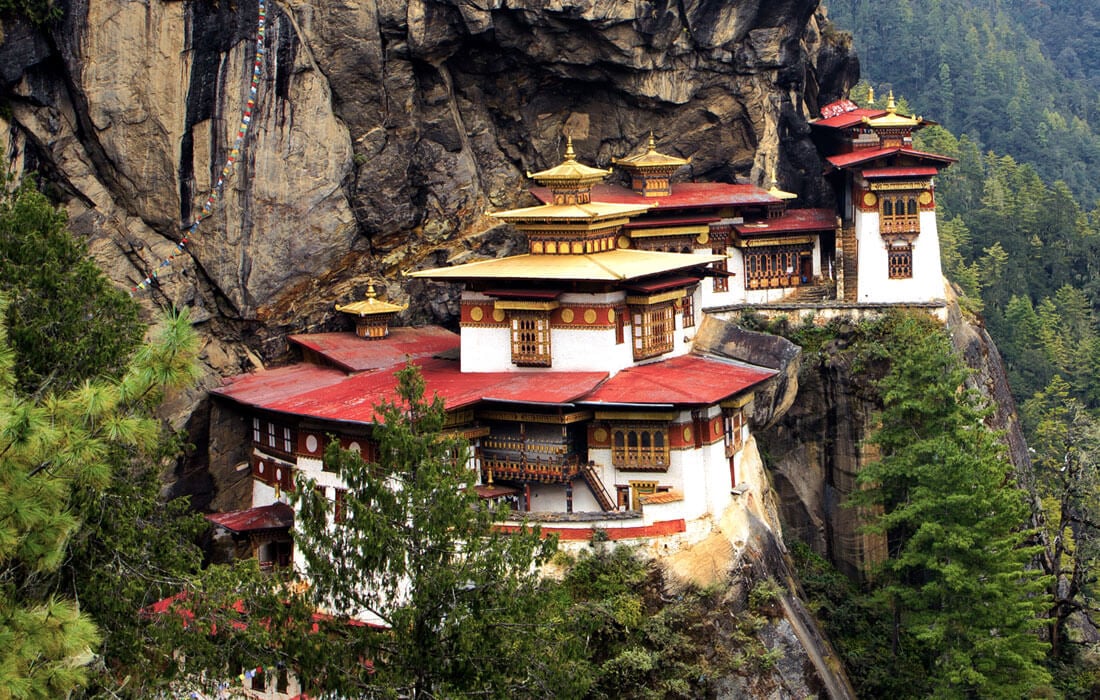





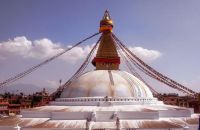
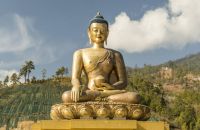
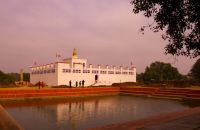
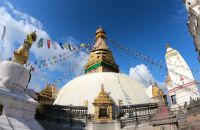
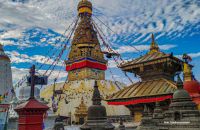
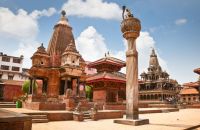
















Recent Comments
Wow, such great detail. I like your article. I want to read more about your blog. Thank you for sharing an amazing post.